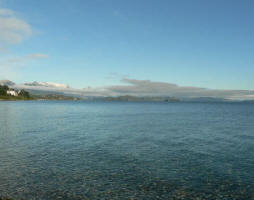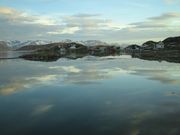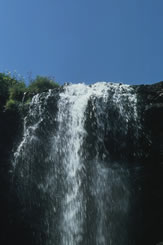 Main Conclusions of Inuagural Meeting
Main Conclusions of Inuagural Meeting
| Released | 10/04/2006 |
|---|
16 November 2005
Friends Hall - Notre Dame University, Beirut
- Key wrap up points from Discussions -
Purpose and context of the event
The Meeting held in Beirut on the 16th of November 2005 is considered as the Inaugural Meeting of the so-called "Country Dialogues" Process for Mediterranean countries in general and for Lebanon in particular. The Mediterranean Component of the European Union's Water Initiative (EUWI) represents a platform and a framework for this process which is wholly led by the partner country, Lebanon.
The aim of the Country Dialogues process, in the context of the Mediterranean Component is, among other things:
- to identify gaps and emerging deficiencies in current national priorities and implementation process to achieve the MDGs and the WSSD water related targets on WSS and IWRM,
- to identify insufficiencies and bottlenecks in key prerequisites posed by donors for national investments on the water sector,
- to identify types of interventions and concrete national framework programmes to meet the set targets,
- to elaborate, discuss and agree on a roadmap for achieving targets at country level,
- and to assist the establishment of a permanent platform for cooperation between key involved partners at the national level including donor agencies.
The Country Dialogues involve the active contribution of all national water stakeholders including government authorities and agencies, local authorities, water users associations, civil society, academia, the private sector as well as international and national donors.
The Country Dialogues' Process is envisaged to involve 4 main stages:
- An Inaugural Workshop which is the our meeting today,
- Country visits for bilateral and multilateral consultations,
- A Workshop to present and endorse a national Roadmap,
- as well as follow up visits and events to overview progress monitoring.
In this context, the scope of the Inaugural Workshop on 16 November, as the Kick-Off event of the Water Country Dialogue for Lebanon, was:
- to inform a multi-stakeholder audience on the Mediterranean Component and the process of the Country Dialogues,
- to identify key actions taken in the country to meet water challenges,
- to exchange information on the achievements and orientation of bilateral and multilateral aid in the water sector in the country,
- to be informed on priority EU processes like the European Neighbourhood Policy, the MEDA Water Programme, the New European Neighbourhood and Partnership Instrument that will substitute MEDA starting from 2007 and the Joint Process between the Water Framework Directive / MED EUWI as well as their linkages and contribution to efforts to achieve water targets in Lebanon,
- and finally to discuss on a process for establishing a strategic collaboration among all participating water stakeholders and with donor agencies, on the country level.
The Country Dialogue Process for Lebanon is envisaged to last for approximately 12 months, with a final output, i.e. a national Roadmap, that will include inter alia: specific targets and indicators, a mapping of the roles and responsibilities of different stakeholders involved, detailed analyses of the current expenditure and needed financing to meet MDG/WSSD targets for WSS and IWRM, prioritised interventions and framework programmes required and currently missing, financial Strategies to bridge financial deficits and gaps as well as terms for the monitoring and reporting of the progress achieved in the future. This Roadmap is also envisaged to assist in guiding further donor planning.
Key emerging issues from discussions during the event
The participants in the Inaugural Event of the Lebanon Country Dialogue covered a very wide range of stakeholders from public authorities, the private sector and NGOs to international donors active in the country (e.g. EU, WB). Interventions covered all pertaining issues from legislation to aid and public-private partnerships. In the sense that the Inaugural meeting was an informative event, it fully achieved its purpose, since a very wide panorama of activities was presented and the identification of the state-of-play and a first approach to needs has been fulfilled.
The Process of the Country Dialogues that started with Lebanon represents an active and learning process for all the involved partners with a great potential of replicability since the acquired experience is highly transferable to other countries and regions.
Most presentations stressed the absence of the necessary resources including human ones to pursue further reforms in the water sector in Lebanon, absence of strategic medium and long term planning for the designing of interventions as well as the lack of proper coordination between the various complementary activities undertaken in the field of water management by the public sector and international donors active in the country.
The lack of a uniform framework for integrated water resources management in the wider Arab region and in Lebanon's neighbouring countries was mentioned as a bottleneck in pursuing proper management of water resources also on the transboundary level.
The progress achieved in recent years in Lebanon that has been reported, for example the reduction of water utilities from 22 to only 4, based on Law 221/2000, is an important step that needs to be supported and complemented with further reforms, aiming inter alia to further reinforcing the autonomy and proper operation of the utilities, both in terms of financing and staffing.
Efforts to approach the pricing, tariffication and cost recovery issues of water supply and sanitation services should also be further reinforced through adequate frameworks; in this context, the issue of public-private partnerships offers an opportunity that should be further explored, adapted and implemented.
Presentations also stressed the need for integrating to a larger extent the use of performance indicators in the operation of utilities as well as in the context of PPPs.
Capacity building, awareness raising and the promotion as well as implementation of innovative technologies for IWRM and water demand management is also urgently required to meet the challenges.
A great need for formulating needs and deficiencies in an effective way so as to represent concrete and bankable projects and targeting to a better use of existing financial resources from national but mainly from international donors has also been stressed. In this respect, it is crucial to reach to concrete results through the Country Dialogue process as soon as possible in order to feed them in the designing phase of the New European Neighbourhood and Partnership Instrument (ENPI) that represents the new financial perspectives for the region starting in 2007. Moreover, the objectives of the National Action Plan (NAP) developed by Lebanon in the framework of the Strategic Action Programme (SAP) of the UNEP/MAP should also be integrated in the priorities for funding under the ENPI.
In this regard, the Mediterranean Component of the EUWI can serve as a means of facilitating not only the identification of the priority needs and actions for Lebanon as well as for the other partner countries to follow but also a means for assisting the exploring of financial support for the implementation of these activities from various sources and donors.
One main output of the process will be that water will eventually get higher on the political Agenda of the country. Moreover, the process will eventually catalyse a better cooperation as well as improved coordination between all stakeholders and activities on water issues on national level.
The process of the Country Dialogue is a country driven one so ownership
and involvement is a key prerequisite to proceed. In the case of Lebanon,
the determination and commitment expressed to the process by the competent
government authorities as well as from all the participating stakeholders
has been a very crucial and positive platform to anchor and build further
the process on.
 you are not logged in
you are not logged in





